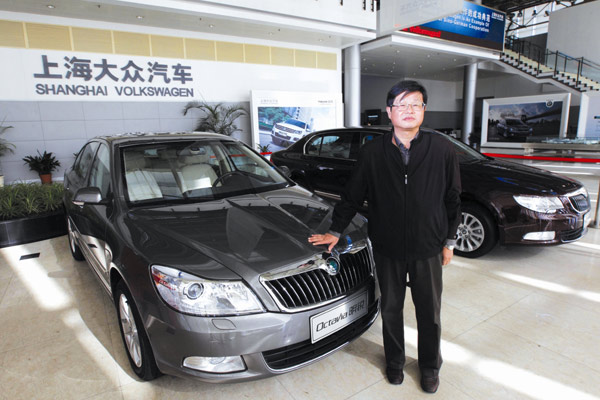Top News
European automakers cash in on China car boom
Updated: 2011-01-14 10:37
By Patrick Whiteley and Xiao Xiangyi (China Daily European Weekly)
|
 Yan Guangming, a senior journalist for Shanghai Automotive News, says the battle between Japanese and German cars in China began last century in a war of slogans with the Japanese fi rst saying: "Where there is a road, there is a Toyota.” GAO ERQIANG / CHINA DAILY |
"China and Germany have never come face-to-face with conflict or dispute in history. Besides, Chinese think highly of German's sincere apology after World War II.
"That's why I say Germany has a natural advantage over Japan."
Political and social tensions between China and Japan over the decades have been no secret and when a faulty Japanese product comes under scrutiny, its brand reputation can easily suffer in China, and such was the case for Toyota last year.
The company recalled 75,500 RAV4 SUVs made at its joint venture plant in Tianjin due to defective brake pedals.
In a first by a global carmaker's top executive, Toyota Motor Corp's President Akio Toyoda apologized to Chinese customers in an emergency press conference on March 1 in Beijing.
Toyoda bowed before a packed and very surprised media gallery.
"However, Toyota, with its ever-widening ambition and perfect after-sales service in China, still attracts a large number of car buyers in spite of its recall fiasco last year," Yan says.
The senior journalist for Shanghai Automotive News says the battle between Japanese and German cars in China began last century in a war of slogans with the Japanese firing first: "Where there is a road, there is a Toyota."
Yan says Germans returned fire with: "I'm not afraid of going anywhere in a Santana."
Almost three decades later, the Santana has taken millions of Chinese people for the rides of their lives, for many their first ever ride in a car because taxi companies bought hundreds of thousands of Santanas.
In 1981, VW began production of the Santana, a model based on the second-generation Passat, and it enjoyed reasonable sales around the world.
In Europe, the Santana name was dropped in 1985 and the car was sold as a Passat before European production ended in 1988 but in China, the Santana became hugely popular with more than 3 million models sold so far. VW recently announced that the last Santana will roll off the production line in 2012.
The story of the Santana reflects the story of the car revolution in China, and especially four-wheel affordability.
When the model made its debut in 1983, urban per capita monthly disposable income in Beijing was 49 yuan (5.7 euros), putting its 200,000-yuan price tag far out of reach of most people.
In 2010, the city's urban per capita monthly disposable income now tops 2,228 yuan ($332), while to drive away in a brand new Santana costs just 100,000 yuan.
"Santana is a legend. The Santana to Chinese is what the Beetle was to Germans and Santana's success is the success of its localization," Yan says.
"Many companies have realized that they have to gain China, or lose the world, but whether it can gain China or not depends on how localized it is here in China."
After Volkswagen hit China's roads, many more foreign carmakers followed but under Chinese law had to partner local companies.
General Motors followed VW to SAIC; VW formed another joint venture with FAW, which also teamed with Mazda; Mercedes-Benz and Hyundai joined BAIC; Toyoya, Honda, Fiat and recently Chrysler joined GAC and Peugeot, Honda, Citroen, and Nissan joined Dongfeng while Ford and recently PSA partnered Chang'an Motors.
Ashvin Chotai, managing director of Intelligence Automotive Asia, says European brands have always been well perceived but there are regional variations regarding branding impact.
"For example, in the south of China, Japanese brands are more popular than European brands," he says.
Chotai says Chinese car buyers, especially those with more sophisticated tastes on the East Coast, are very discerning and brand conscious though not necessarily brand loyal.
"Foreign brands are perceived more positively and there is prejudice against Chinese brands although this is slowly changing," he says.
E-paper

Ear We Go
China and the world set to embrace the merciful, peaceful year of rabbit
Preview of the coming issue
Carrefour finds the going tough in China
Maid to Order
Specials

Mysteries written in blood
Historical records and Caucasian features of locals suggest link with Roman Empire.

Winning Charm
Coastal Yantai banks on little things that matter to grow

New rules to hit property market
The State Council launched a new round of measures to rein in property prices.
